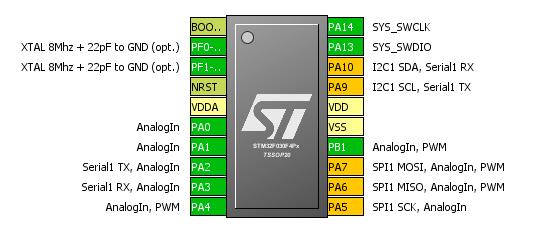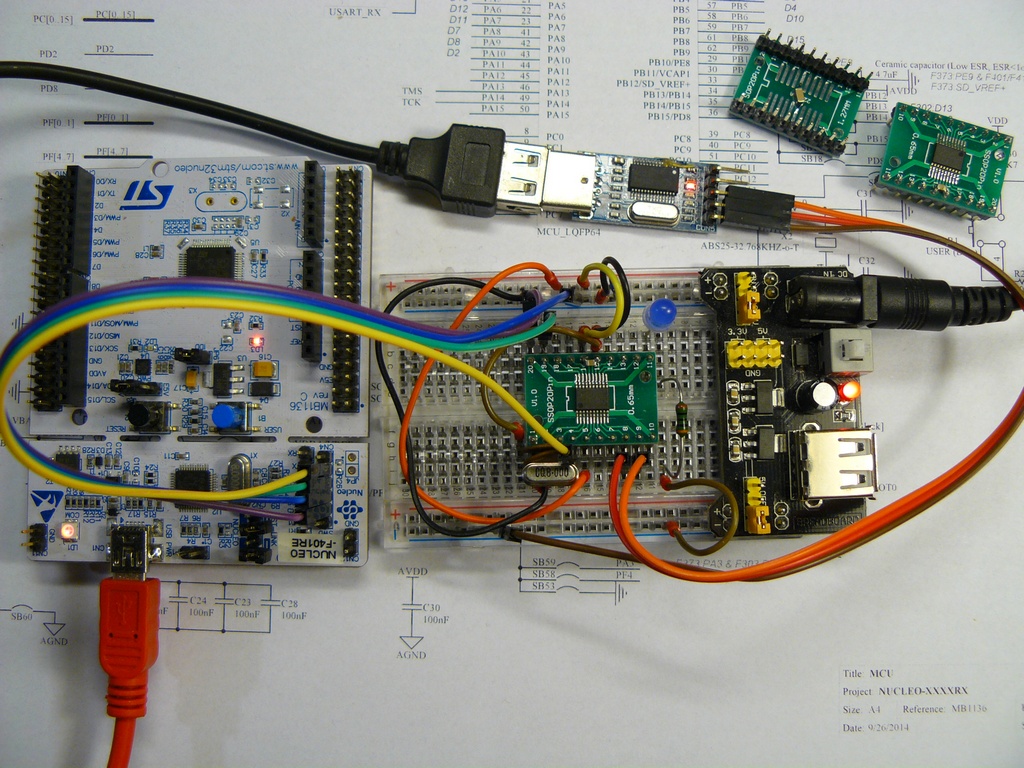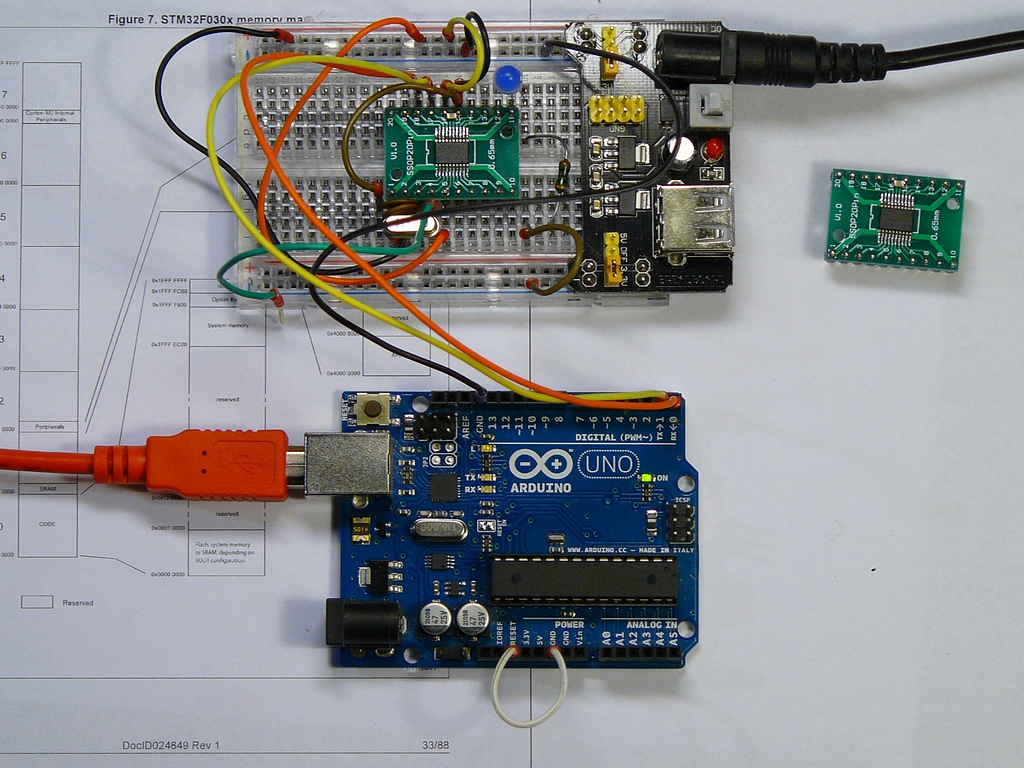Modification of mbed-src library only for STM32F030F4, very cheap microcontroller in 20-Pin TSSOP package, with 16Kbytes of Flash and 4Kbytes of Ram. **Target for online compilator must be Nucleo 32F030R8.**
Dependents: STM32F031_blink_LED_2
Information
For programming similar chips in TSSOP20 package, but with 32kB flash: STM32F031F6 and STM32F050F6 (virtually identical to STM32F031F6 and no longer produced but still on sale), it is recommended to use NUCLEO-F031K6 as compiler platform, and the mbed library without the need for any modifications.
Just remember that the only significant difference between these chips and NUCLEO-F031K6 is the lack of pins: PB_0, PB_3, PB_4, PB_5, PB_6, PB_7, PA_11, PA_12, PA_15 in TSSOP-20.
STM32F030F4 pinout (pin functions supported in mbed library).

other pins:
| Pin nr | Pin name | Connected | ST-LINK on Nucleo (programming and debug) |
|---|---|---|---|
| 1. | BOOT0 | GND | |
| 4. | NRST | CN4 pin 5 | |
| 5. | VDDA | +3.3V | |
| 15. | VSS | GND | CN4 pin 3 |
| 16. | VDD | +3.3V | |
| 19. | SWDIO | CN4 pin 4 | |
| 20. | SWCLK | CN4 pin 2 |
- Remove jumpers CN2 on Nucleo when CN4 is connected to STM32F030F4
- NRST connection is not necessarily needed, but in this case, after programming it is necessary to manually reset the target processor
STM32R030F4 programming using Nucleo (any type):
 Notes:
Notes:
- When programming using the Nucleo virtual disk (drag and drop) , first turn on the power STM32F030F4, and then connect Nucleo to USB. When programming with "ST-LINK Utility", it does not matter.
STM32R030F4 programming using Arduino (as a simple USB-Serial converter) and FlyMcu program:

Notes:
- For Usart in STM32F030F4, only 5V tolerant TX, RX pins are pins 17 and 18. Just their uses internal serial bootloader, so you can use such Arduino or other USB-Serial converter operating as standard 5V.
- Where used FlyMcu, binary file from online compiler Mbed need to convert to intel hex file and during the conversion add the data offset 0x08000000 (or if offset is 0, manually add/edit the first line of the .hex file to ":020000040800F2").
- During programming procedure, pin 1 (BOOT0) should be connected to 3.3 V. And before contact with the loader program, temporarily pin 4 (NRST) shorted to GND to reset the chip. After programming BOOT0 is connected to GND.
- In this set with Arduino Uno, the "Flash loader demonstrator" from STM does not work (does not recognize the response from the chip at the initial stage of connection). But with Arduino Duemilanove program "STM Flash loader demonstrator" works perfectly (ver. 2.7.0). And do not need any additional file conversion (as the need for FlyMcu). You can use a binary file directly from the on-line compiler mbed.
Warning.
Because of the small size of the STM32F030F4 flash, for programs that use UART, it is proposed not to use the Serial class but use the <cstdio> (stdio.h) functions that directly use stdout and stdin (e.g printf().putchar(),getchar(),vprintf(),scanf() ).
Example:
version with serial class
#include "mbed.h"
Serial pc(USBTX, USBRX); // tx, rx
int main()
{
pc.printf("Hello World!\n");
}
consuming 13.7kB FLASH and 1.5kB RAM
but this:
version without serial class
#include "mbed.h"
int main()
{
printf("Hello World!\n");
}
consuming only 8.7kB FLASH and 0.4kB RAM
5kB used flash difference (with 16kB total size) !!!
However, if you need other than the default UART settings for stdin and stdout (that is 9600b, pins PA_2, PA_3), you can do as an example:
change uart pins and speed
#include "mbed.h"
// declarations needed to change here the parameters of stdio UART
extern int stdio_uart_inited;
extern serial_t stdio_uart;
int main()
{
// for change pins
serial_init(&stdio_uart, PA_9,PA_10);
stdio_uart_inited=1;
// for change baud rate
serial_baud(&stdio_uart, 115000);
printf("Hello World!\n");
}
uVision users
In the case of online compilation of the program with this library using Keil, to prevent linker errors set in the project options "One ELF Section per Function" and Optimisation: Level 2.
Additional information (and inspiration for this modification):
http://developer.mbed.org/forum/electronics/topic/5184/
http://developer.mbed.org/questions/4643/Does-mbed-support-STM32F030F4/
http://developer.mbed.org/questions/2927/mbed-on-other-packages-stm32f030f4-TSSOP/
http://developer.mbed.org/questions/4139/Programming-STM32F030F4-with-Nucleo-F030/
api/CAN.h
- Committer:
- mega64
- Date:
- 2017-02-14
- Revision:
- 11:79a2d67cd509
- Parent:
- 0:38ccae254a29
File content as of revision 11:79a2d67cd509:
/* mbed Microcontroller Library
* Copyright (c) 2006-2013 ARM Limited
*
* Licensed under the Apache License, Version 2.0 (the "License");
* you may not use this file except in compliance with the License.
* You may obtain a copy of the License at
*
* http://www.apache.org/licenses/LICENSE-2.0
*
* Unless required by applicable law or agreed to in writing, software
* distributed under the License is distributed on an "AS IS" BASIS,
* WITHOUT WARRANTIES OR CONDITIONS OF ANY KIND, either express or implied.
* See the License for the specific language governing permissions and
* limitations under the License.
*/
#ifndef MBED_CAN_H
#define MBED_CAN_H
#include "platform.h"
#if DEVICE_CAN
#include "can_api.h"
#include "can_helper.h"
#include "FunctionPointer.h"
namespace mbed {
/** CANMessage class
*/
class CANMessage : public CAN_Message {
public:
/** Creates empty CAN message.
*/
CANMessage() : CAN_Message() {
len = 8;
type = CANData;
format = CANStandard;
id = 0;
memset(data, 0, 8);
}
/** Creates CAN message with specific content.
*/
CANMessage(int _id, const char *_data, char _len = 8, CANType _type = CANData, CANFormat _format = CANStandard) {
len = _len & 0xF;
type = _type;
format = _format;
id = _id;
memcpy(data, _data, _len);
}
/** Creates CAN remote message.
*/
CANMessage(int _id, CANFormat _format = CANStandard) {
len = 0;
type = CANRemote;
format = _format;
id = _id;
memset(data, 0, 8);
}
};
/** A can bus client, used for communicating with can devices
*/
class CAN {
public:
/** Creates an CAN interface connected to specific pins.
*
* @param rd read from transmitter
* @param td transmit to transmitter
*
* Example:
* @code
* #include "mbed.h"
*
* Ticker ticker;
* DigitalOut led1(LED1);
* DigitalOut led2(LED2);
* CAN can1(p9, p10);
* CAN can2(p30, p29);
*
* char counter = 0;
*
* void send() {
* if(can1.write(CANMessage(1337, &counter, 1))) {
* printf("Message sent: %d\n", counter);
* counter++;
* }
* led1 = !led1;
* }
*
* int main() {
* ticker.attach(&send, 1);
* CANMessage msg;
* while(1) {
* if(can2.read(msg)) {
* printf("Message received: %d\n\n", msg.data[0]);
* led2 = !led2;
* }
* wait(0.2);
* }
* }
* @endcode
*/
CAN(PinName rd, PinName td);
virtual ~CAN();
/** Set the frequency of the CAN interface
*
* @param hz The bus frequency in hertz
*
* @returns
* 1 if successful,
* 0 otherwise
*/
int frequency(int hz);
/** Write a CANMessage to the bus.
*
* @param msg The CANMessage to write.
*
* @returns
* 0 if write failed,
* 1 if write was successful
*/
int write(CANMessage msg);
/** Read a CANMessage from the bus.
*
* @param msg A CANMessage to read to.
* @param handle message filter handle (0 for any message)
*
* @returns
* 0 if no message arrived,
* 1 if message arrived
*/
int read(CANMessage &msg, int handle = 0);
/** Reset CAN interface.
*
* To use after error overflow.
*/
void reset();
/** Puts or removes the CAN interface into silent monitoring mode
*
* @param silent boolean indicating whether to go into silent mode or not
*/
void monitor(bool silent);
enum Mode {
Reset = 0,
Normal,
Silent,
LocalTest,
GlobalTest,
SilentTest
};
/** Change CAN operation to the specified mode
*
* @param mode The new operation mode (CAN::Normal, CAN::Silent, CAN::LocalTest, CAN::GlobalTest, CAN::SilentTest)
*
* @returns
* 0 if mode change failed or unsupported,
* 1 if mode change was successful
*/
int mode(Mode mode);
/** Filter out incomming messages
*
* @param id the id to filter on
* @param mask the mask applied to the id
* @param format format to filter on (Default CANAny)
* @param handle message filter handle (Optional)
*
* @returns
* 0 if filter change failed or unsupported,
* new filter handle if successful
*/
int filter(unsigned int id, unsigned int mask, CANFormat format = CANAny, int handle = 0);
/** Returns number of read errors to detect read overflow errors.
*/
unsigned char rderror();
/** Returns number of write errors to detect write overflow errors.
*/
unsigned char tderror();
enum IrqType {
RxIrq = 0,
TxIrq,
EwIrq,
DoIrq,
WuIrq,
EpIrq,
AlIrq,
BeIrq,
IdIrq
};
/** Attach a function to call whenever a CAN frame received interrupt is
* generated.
*
* @param fptr A pointer to a void function, or 0 to set as none
* @param event Which CAN interrupt to attach the member function to (CAN::RxIrq for message received, CAN::TxIrq for transmitted or aborted, CAN::EwIrq for error warning, CAN::DoIrq for data overrun, CAN::WuIrq for wake-up, CAN::EpIrq for error passive, CAN::AlIrq for arbitration lost, CAN::BeIrq for bus error)
*/
void attach(void (*fptr)(void), IrqType type=RxIrq);
/** Attach a member function to call whenever a CAN frame received interrupt
* is generated.
*
* @param tptr pointer to the object to call the member function on
* @param mptr pointer to the member function to be called
* @param event Which CAN interrupt to attach the member function to (CAN::RxIrq for message received, TxIrq for transmitted or aborted, EwIrq for error warning, DoIrq for data overrun, WuIrq for wake-up, EpIrq for error passive, AlIrq for arbitration lost, BeIrq for bus error)
*/
template<typename T>
void attach(T* tptr, void (T::*mptr)(void), IrqType type=RxIrq) {
if((mptr != NULL) && (tptr != NULL)) {
_irq[type].attach(tptr, mptr);
can_irq_set(&_can, (CanIrqType)type, 1);
}
else {
can_irq_set(&_can, (CanIrqType)type, 0);
}
}
static void _irq_handler(uint32_t id, CanIrqType type);
protected:
can_t _can;
FunctionPointer _irq[9];
};
} // namespace mbed
#endif
#endif // MBED_CAN_H